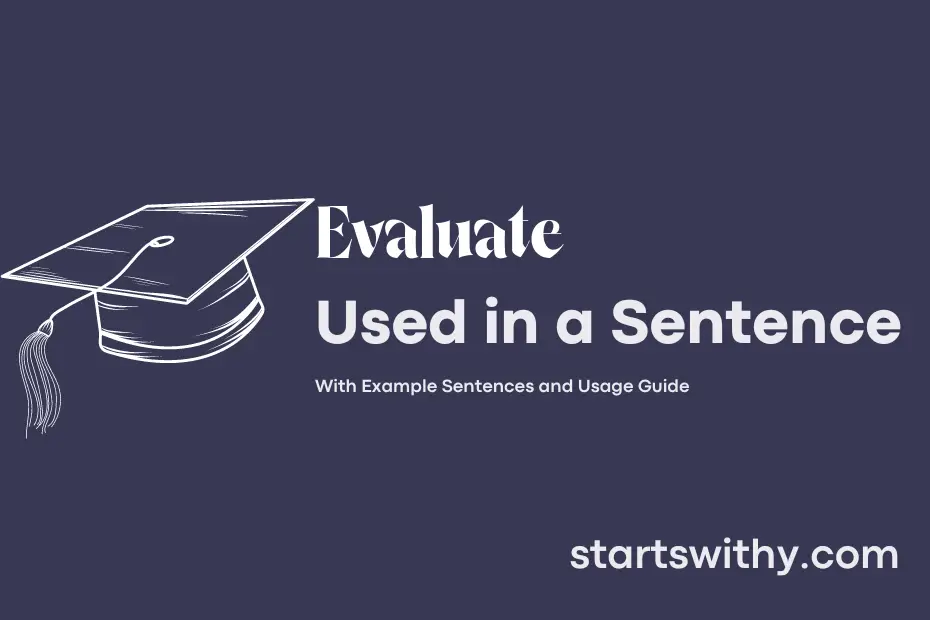If you’ve ever been asked to evaluate something, you know that this process involves assessing and analyzing its qualities or characteristics. When you evaluate something, you essentially form an opinion or judgment about it based on certain criteria or standards.
Evaluating can be done in various contexts, such as academics, performance reviews at work, or even when making a purchase decision. It helps in making informed decisions and understanding the value or effectiveness of something.
7 Examples Of Evaluate Used In a Sentence For Kids
- You can evaluate how many fruits are in the basket.
- We can evaluate the colors of the rainbow.
- Let’s evaluate how loud the birds are chirping.
- Please evaluate how many stars you can see in the sky.
- Can you evaluate how soft this teddy bear is?
- We will evaluate how fast the cars are moving.
- How about we evaluate the different shapes of the clouds?
14 Sentences with Evaluate Examples
- Evaluate the importance of extracurricular activities in enhancing your college experience.
- Before making a decision, it’s crucial to evaluate all the pros and cons.
- Take the time to evaluate your study habits and make any necessary adjustments.
- It’s essential to constantly evaluate your progress to ensure you are on track with your academic goals.
- When choosing electives, make sure to evaluate how they align with your future career aspirations.
- Before committing to a project, evaluate the time and resources required for its completion.
- Don’t hesitate to evaluate different study techniques to find what works best for you.
- Evaluate the feedback you receive from professors to improve your performance in future assignments.
- As you approach graduation, it’s important to evaluate your skills and strengths to plan your career path.
- When faced with academic challenges, it’s necessary to evaluate the root cause and address it promptly.
- Before registering for courses, evaluate the schedule to ensure it aligns with your personal commitments.
- Always evaluate the credibility of the sources you use for research papers.
- After completing a group project, make sure to evaluate the team dynamics and communication for future improvement.
- Take the time to evaluate your financial situation before making decisions about extracurricular expenses.
How To Use Evaluate in Sentences?
Evaluate is used to assess or judge the value, quality, importance, or significance of something. When using Evaluate in a sentence, you want to thoroughly analyze and consider the given situation or information to form a conclusion.
Here is a guide on how to use Evaluate in a sentence:
-
Identify what you need to Evaluate. This could be a product, a situation, a performance, a decision, or any other subject that requires assessment.
-
Collect all relevant information. Gather all the necessary facts, data, and details that will help you in forming an opinion or decision.
-
Consider different perspectives. Look at the subject from various angles to ensure a well-rounded evaluation.
-
Analyze the information. Break down the data and information to understand its implications and significance.
-
Form a conclusion. Based on your analysis, form an opinion or decision on the subject you are Evaluating.
Example Sentence: “After carefully evaluating the pros and cons of each option, I decided to go with the most cost-effective solution.”
Remember to take your time when using Evaluate in a sentence, as it involves a thoughtful consideration of all relevant factors to make an informed judgment or decision.
Conclusion
In conclusion, the examples of sentences showcasing the use of the keyword “evaluate” demonstrate the flexibility and applicability of this term in different contexts. Whether it is evaluating study data, performance reviews, or the effectiveness of a new strategy, understanding how to assess and judge something critically is crucial in making informed decisions. By employing the skill to evaluate, individuals can make well-informed judgments and improvements in various aspects of their personal and professional lives.
Therefore, mastering the ability to evaluate effectively is essential for problem-solving, decision-making, and continuous growth. It empowers individuals to analyze information, critically assess options, and determine the best course of action. Ultimately, the skill to evaluate leads to more informed choices and better outcomes in both personal and professional settings.



